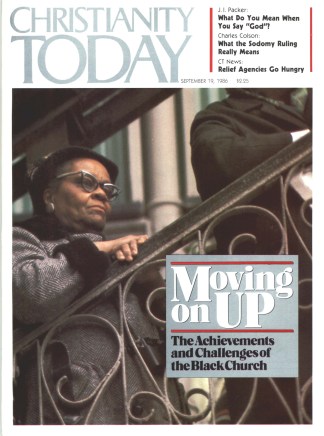BUSTER SOARIES1Buster Soaries is head of Conquerors International, an urban youth ministry dedicated to assisting the black church in the evangelization and discipling of youth. An evangelist and motivational speaker, he was formerly national coordinator of Operation PUSH (founded by Jesse Jackson); a community organizer for the National Urban League; and, for ten years, a Harlem pastor.
The year 1970 roughly marked the end of legal, formal, and institutional cruelty aimed at American blacks. Certainly, racism is not dead! But the overt manifestation of racism is illegal.
In this respect the America of today is different—not perfect, but different. And the black church must now consider new responsibilities. In the more oppressive past, the black church never needed to be actively evangelistic. The limited social options of blacks made the church a magnet that naturally attracted generation after generation.
Unfortunately, the primary messages and values of the black community today are no longer coming from the Bible and the church. They are coming from television and radio. Also, because this is an era of inherited rights, the post-1970 generation does not possess the sense of struggle that every other generation knew. It is without the determination that can result from adversity.
In many respects this is true of the youth of all races. The current generation knows little about obstacles of the type faced by its forefathers. With that, and the fattening and softening influence of the media, young people have a warped perspective on survival and success. Somehow they have been convinced that if people simply continue to breathe long enough, they will obtain the desires of their hearts.
The grim irony is that this lax attitude has formed at a time when an energetic attitude is greatly needed. Technology has reduced the world to a small village, and this generation must compete with the entire world unlike any previous generation. America cannot produce world leaders if its youth continue to be plagued with lassitude and moral degeneracy.
New Circumstances And A New Role
Under these changed circumstances, what is the role of the black church? Certainly the church must support those organizations and institutions that provided for the victories of social justice. But the foremost challenge that is facing the black church today is to evangelize the new generation. It is only in this way that the church can retain its significance and insure the endurance of its previous victories.
An entire country is hypnotized by television, mesmerized by music, and anesthetized by drugs and alcohol. It is being scandalized by divorce, pornography, teen pregnancy, suicide, abortion, and crime. The nation’s schools are failing primarily because its families have abdicated their responsibility to raise their own children. While technology grows theology shrinks, and God is reduced to a convenience item for casual use.
To the American community at large, the overall degeneracy constitutes a greater threat than terrorism or communism. No community or nation can be considered great while its citizens destroy themselves with drugs and alcohol. No community can demand respect from without while its senior citizens are afraid to walk the streets within.
In the black community this epidemic of reckless abandonment has become as formidable a foe as organized racism ever was. Black Christians (and all other Christians) must unapologetically rise to the occasion and challenge this new generation with the primary message of the church: “You must be born again!”
The Problem At Heart
Critics of this proposal say it is a simplistic and cowardly response to a complex predicament. Yet there can be no successful contradiction of a primary reality: Though social progress does not guarantee spiritual growth, spiritual growth guarantees social progress. There is no legislation that will lower the rate of teenage pregnancy—the problem is spiritual. There is no government program that can keep fathers at home to help their wives raise their children—the problem is spiritual. There is no assignment that can give students the desire to learn—the problem is spiritual.
Unless there is a revival of spiritual values and an understanding of divine principles, people will never maximize the use of what they do have, but will continue to complain about what they do not have. Civil rights issues like affirmative action, busing, quotas, and voting rights are all moot issues to a generation that can dance better than it can read, and can cuss but can’t pray. The souls and the lives of an entire generation are at stake, and no one can refute the need for the black church to put first things first.
The Whole Of Evangelism
In order for the black church to make a difference in black culture, it is necessary to understand all the implications of evangelism:
1. The black church must get the attention of youth. The church must pool its resources, expand its programs, and utilize nontraditional means to preach the gospel to young people. The gospel of Jesus Christ has been powerful enough to make an impact on every generation, and it can make the same impact on this one if it is preached. The reason children know the latest songs is because they hear them. The church must do new things—such as community-wide youth crusades, interdenominational youth outreach, after school midweek youth Bible studies—so that the gospel will be heard.
2. The church must minister to the entire family. Young people are products of their environment. The church must be prepared to minister to and treat damaged families as it attempts to save black communities. The absence of the traditional church influence has left many families without guidelines for successful nuturing and functioning. Emphasis will have to be placed on family life, and models of successful family life will have to be promoted by the churches.
3. The church must mobilize for spiritual renewal as it did for civil rights. The civil rights movement was successful because people were committed and sacrificially gave of themselves to create change. When a trouble spot was identified, people spontaneously converged on it to demand respect and justice. The same level of intense mobilization is necessary for a spiritual awakening in black America. Only this will rid communities of drugs, illicit sexual behavior, and the cloud of death that hovers over their heads. There must be a spiritual revolution!
4. The church must develop and rebuild neighborhoods. Urban decay is on the one hand a great American nemesis, and on the other hand a great opportunity. Those who serve the spiritual needs of the black community must also rebuild the physical and economic infrastructure of that community
This can be done without relying solely on the government. The black community’s collective economic strength affords it leverage over institutional and individual assets for the private financing of various projects. As blacks have organized and put companies out of business because of their unfavorable policies, they can also organize and put people in business that will stabilize the community. Most aid will not come from government but rather from self-help and the private sector.
Happily, much of the above is already happening. Leaders in every major denoimination, and blacks in parachurch ministries, are responding to the need for a new formula for ministry. Conferences are being held to discuss evangelism, and materials are being developed for personal and group growth. Specialized ministries committed to family life, youth, discipleship, and evangelism are being born every day. There are summit meetings of black Christian leaders. And the major emphasis of fast-growing black churches is spiritual growth.
The Role Of The White Church
Cultural circumstances place white and black Christians in a more similar situation than ever before. Accordingly, there are many ways the white church can correlate efforts with the black church.
1. Recognize and understand the history of the relationship of the white and black churches. In other words, realize the unique struggle black Christians have had in “embracing the religion of their oppressors.”
2. Join forces with the black movement as it attempts to reach this new generation. Every ounce of talent and commitment that can be mustered is needed to win this generation of black and white youth.
3. Pray about the racial attitudes that still exist and have never been confessed. If racial reconciliation is to occur in America, it will only be through the church. Whites and blacks seem to be so satisfied with the division between them that they see no need to work toward healing and unity. The goal should be the elimination of distinct separation between black and white Christians.
4. Respect the presence and authenticity of the traditional black church. Too often white Christians talk about the black community as if there are no churches there. True enough, the black church is not perfect—but neither is the white church. Sincere efforts to assist the black community will not circumvent the black church. They will assist that church, the only institution that has stood for blacks through the years.
The Hope
Ultimately, the new generation cannot be saved if the old generation is uncertain about itself. When youth are their evangelistic target, adults will have to practice what they preach. The number one reason teenagers give for not attending church is the hypocrisy that exists among adults. Adults cannot teach what they do not know and cannot lead where they will not go.
A few hundred years ago, God sent some Africans to North America to suffer human indignation, to be prepared in a special way for a special ministry. The black church today has a unique challenge—but God has provided it with unique credentials. Not only does it have a moral and historical mandate to generate a consciousness of God’s will for black America, but it has a profound opportunity to share, in a spirit-filled way, the power and joy realized through Christ-centered living.
Black Americans have come up the rough side of the mountain with faith as their only weapon. They must share this faith and continue to contribute to the building of a great nation. Surely God has chosen them for this great calling and has placed them in this position for just such a time.
The Black Lifestyle: Framed by Scripture
The living reality of God and the experience of worship have both been manifest from the beginning of the black North American experience. The reality of life in a bondage situation provided great impetus to maintain closeness to God. The Bible has no shortage of people and themes that represent the underdog, and black America received its spiritual formulae from biblical exposition.
Black Americans generally did not have social clubs, vacations, schools, political parties, and other societal options. Consequently, church-related activities were spiritual, social, recreational, and educational. The sum total of the black lifestyle was framed by Scripture and its teachings.
Finally, the constant recognition of the black social situation reminded blacks they did not have the “luxury” of living an immoral life. Not only would it lead to eternal destruction, but blacks knew they would never achieve equality or greatness in this country unless they had impeccable moral character. This, too, was based on the authority of Scripture, the example of Christ, and a desire to please God.
The press (religious as well as secular) has chosen to highlight the sensational political aspects of the church. But in the midst of the protest and the marching there was always Sunday school, worship, prayer meetings, baptisms, funerals, counseling, and all the other basic activities of spiritual nurturing. The black social movement was an outgrowth of this vital spirituality—not the poisoning of liberal theology.
By Buster Soaries.










